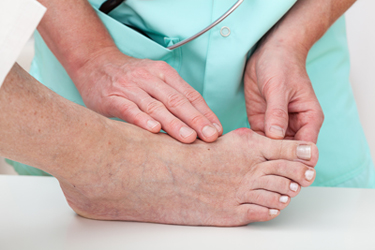
Bunions are bony bumps that form at the base of the big toe, where the joint becomes enlarged and misaligned. This condition develops when the big toe pushes against the toes next to it, forcing the joint to protrude outward. Bunions are often caused by genetic predisposition, wearing tight or high-heeled shoes, or conditions like arthritis that affect joint health. Over time, the joint inflammation can lead to secondary osteoarthritis, causing pain, stiffness, and swelling. Bone spurs may also form, adding to the discomfort. Common symptoms include pain, swelling, redness, and difficulty wearing shoes due to the enlarged joint. As the condition worsens, mobility can become limited. Treatment options vary based on severity. Conservative methods include wearing wide-toed shoes and using orthotics. In more advanced cases, surgery may be needed to realign the joint and relieve symptoms. If you have a painful bunion, it is suggested that you consult a podiatrist to assess the severity and provide appropriate treatment.
If you are suffering from bunion pain, contact Deborah Rosenfeld of Rosenfeld Podiatry. Our doctor can provide the care you need to keep you pain-free and on your feet.
What Is a Bunion?
Bunions are painful bony bumps that usually develop on the inside of the foot at the joint of the big toe. As the deformity increases over time, it may become painful to walk and wear shoes. Women are more likely to exacerbate existing bunions since they often wear tight, narrow shoes that shift their toes together. Bunion pain can be relieved by wearing wider shoes with enough room for the toes.
Causes
- Genetics – some people inherit feet that are more prone to bunion development
- Inflammatory Conditions - rheumatoid arthritis and polio may cause bunion development
Symptoms
- Redness and inflammation
- Pain and tenderness
- Callus or corns on the bump
- Restricted motion in the big toe
In order to diagnose your bunion, your podiatrist may ask about your medical history, symptoms, and general health. Your doctor might also order an x-ray to take a closer look at your feet. Nonsurgical treatment options include orthotics, padding, icing, changes in footwear, and medication. If nonsurgical treatments don’t alleviate your bunion pain, surgery may be necessary.
If you have any questions, please feel free to contact our office located in Marlton, NJ . We offer the newest diagnostic and treatment technologies for all your foot care needs.

